外研八上Module5-8重点短语,句型,语法复习概要
外研版八年级上册Module 5知识点整理

外研版八年级上册Module 5知识点整理一.重点短语1.in the end最后,终于2.be famous for因……而出名”3.would like想要4.the beginning of……的开头5.send sb. to sp.把某人送到某地6.be named被命名为……7.give a warm welcome to热情欢迎……8.take place发生9. no idea 不知道二.用法集萃1.want to do sth.想要做某事2.offer to do sth.主动提出做某事3.plan to do sth.计划/打算做某事4.hope to do sth.希望做某事5.Let’s do sth.让我们做某事吧。
6.Why don't we do sth?我们为什么不做某事呢?7.make sb./sth.+adj.使某人/某物处于……状态8.It is +adj. +to do sth.做某事是……的.三.重点句型1.Lingling offered to take me there.玲玲提议带我去那儿.2.He’s especially famous for his play Teahouse.他尤其以他的话剧«茶馆»而著名。
3.Teahouse is one of Lao She’s most famous plays.«茶馆»是老舍最著名的话剧之一。
o She Teahouse gives a warm welcome to everyone from all over the world.老舍茶馆热情欢迎来自世界各地的人们.四.语法归纳:(一)动词不定式作宾语(二)双宾语教材中含有动词不定式的句子:1.You know, I wanted to see the Beijing Opera.你知道,我想看京剧。
2.Lingling offered to take me there.玲玲提议带我去那儿。
外研版英语八年级上册Module 5单元知识点归纳总结(详细版)

Module 5一.重点短语:1.主要的事情2.不知道3.主动提出做---- 给某人提供、提议什么4.带某人去-----5.最后6.下次7.因---以---对谁--而出名8.在中国社会9. 平民老百姓的生活10.从19世纪末到二十世纪中期11.把某人送到某地12.毕业后13. 回到中国14.被称为---15.在老舍茶馆16.热情欢迎---17.发生18.中国最伟大的作家之一19.二十世纪前半期20.思考社会21.一个很好的选择22.对---正合适,适合于---23.把---演的活灵活现,演的逼真24.表现的相当出色,做的很棒25.茶馆的主人26.同时27.现代中国28.对人们的生活了解了许多29.大约公元前600年1.the main thing2.have no idea3.offer to do sth offer sb sth =offer sth to sb4.take sb to some place5.at last/in the end6.next time7.be famous for ---as ---to sb8.in Chinese society 9.the lives of common people10.from the end of the nineteenth century to the middle of the twentieth century11.send sb to ---12.after finishing school13.return to China =come /go back to China14.be named ---15.at Lao She Teahouse 16.give a welcome to sb 17.take place18.one of China’s greatest writers 19.the first half of the twentieth century20.think about society 21.a very good choice22.be right for ---23.bring----to life 24.do a very good job25.the owner of the teahouse 26.at the same time27.modern china 28.learn a lot about people’s lives29.around 600BC三重点句型1.我想看京剧所以玲玲主动提出带我去那里2.京剧的戏词很难懂,但男演员和女演员很棒。
(完整)外研版八年级英语上册Module5知识点总结,推荐文档

外研版八年级上册Module 5 知识点归纳一.短语强记drink tea 喝茶,in the end最后,main thing主要的事情,next time下次,no idea 不知道,be famous for因……而闻名,would like想要,one of… ……之一,common people普通人,the end of the nineteenth century 19世纪末,send…to 把……送到……,return to回到……,be named被命名为,the People’s Art ist人民艺术家,magic shows魔术表演,give a warm welcome to 热烈欢迎……,take place 发生,think about考虑,at the end of 在……末尾,have a great time过得愉快,at the same time同时二.知识点解析1. actress n. 女演员actor n.男演员2.want to do sth是主语某人自己想要做某事;want sb to do sth是主语某人想要让另外一人做某事want to______the Beijing Opera想去看京剧3.offer① offer sth. 主动提供某物,offer_____ ______提供一些建议② offer sb. sth.=offer sth. to sb. 给某人提供某物,offer a good job___him给他提供一份好工作③ offer to do sth. 主动提出做某事,offer ___ ____ me主动帮助我4.hope to do sth.希望做某事5.agree to do sth.同意做某事6.take…to…带某人或某物去某地,后接地点副词,to可以省略。
take me there7.in the end 最后,终于,相当于finally或at lastat the end of …在…的末尾,在…的尽头, at the _____ of the road8.No idea=I have no idea./ I don’t know.9.be famous for 因……闻名,Lao She is famous ______his play teahouse.be famous as 作为……而闻名, Lao She is famous ______a great writer.10.show①“展示;显示;给……看” show sb. sth.或show sth. to sb.给某人看或者展示某物,show me a book= show a book____me,注意:“show it(them) to sb.”结构。
外研版初二英语八年级Module 5知识点
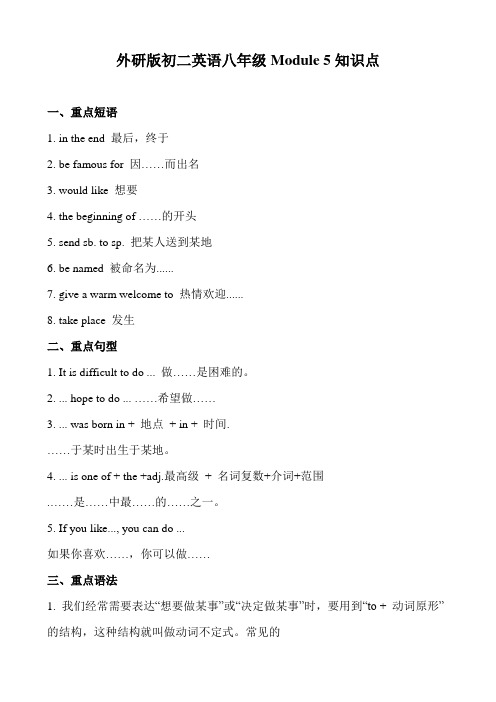
外研版初二英语八年级Module 5知识点一、重点短语1. in the end 最后,终于2. be famous for 因……而出名3. would like 想要4. the beginning of ……的开头5. send sb. to sp. 把某人送到某地6. be named 被命名为......7. give a warm welcome to 热情欢迎......8. take place 发生二、重点句型1. It is difficult to do ... 做……是困难的。
2. ... hope to do ... ……希望做……3. ... was born in + 地点+ in + 时间.……于某时出生于某地。
4. ... is one of + the +adj.最高级+ 名词复数+介词+范围.……是……中最……的……之一。
5. If you like..., you can do ...如果你喜欢……,你可以做……三、重点语法1. 我们经常需要表达“想要做某事”或“决定做某事”时,要用到“to + 动词原形”的结构,这种结构就叫做动词不定式。
常见的后接动词不定式作宾语的动词有:plan, decide, want, agree, try, hope, offer, like, need 等2. 英语中,有些动词可以接两个宾语,即指人的间接宾语和指物的直接宾语,这两个宾语称为“双宾语”。
此类动词常见的有:buy, pass, give, offer, show, bring, send 等。
其句型结构为:主语+动词+间接宾语+直接宾语= 主语+ 动词+ 直接宾语+ 介词(for / to) + 间接宾语注意:当表示物的宾语为代词时,只能使用主语+ 动词+ 直接宾语+ 介词+ 间接宾语”的表达形式。
例如:Can you send it to me as soon as possible?你能尽快把它邮寄给我吗?增强背诵记忆的方法• 勤动手指锻炼手指功能可健脑益智,促进思维。
外研社八年级英语上册Module5知识点

Module 5 Lao She Teahouse一、重点词组1、want to do 想做某事2、offer to do 主动提出做某事3、plan to do 计划做某事4、hope to do 希望做5、the traditional Beijing Opera 传统京剧6、easy/difficult/hard to understand 容易/难理解7、take sb. to sp. 带某人去某处8、in the end 最后,终于9、be famous for 因为…而闻名10、would like to do 想要做某事11、understand the main ideas 理解主旨12、one of the most famous plays 最有名的戏剧之一13、the end of the nineteenth century 十九世纪末14、the middle of the twentieth century二十世纪中期15、People ’s Artist 人民艺术家16、all over the world/around the world 全世界17、take place 发生18、at the same time 同时19、from…to 从...到二、重点句型1、I want to see Beijing Opera.want to do something. 想做某事2、So Lingling offered to take me there.offer to do something 主动提出做某事【拓展】offer 可以做名词,“提议、出价、提供”3、We only planned to watch for an hour.plan to do something 计划做某事4、I hope to under more next time.hope to do something希望做某事5、It was difficult to understand the words.It’s +adj+(for/of sb.)+ to do sth. 对某人来说做某事是怎么样的。
八年级上册外研版英语书笔记

八年级上册外研版英语书笔记外研版八年级上册英语书笔记。
一、Module 1 How to learn English。
(一)重点单词。
1. pair.- n. (相关的)两个人,一对,一双。
例如:a pair of shoes(一双鞋);a pair of glasses(一副眼镜)。
- 常见搭配:in pairs(成对地,成双地)。
2. correct.- v. 改正;纠正。
例如:Please correct your mistakes.(请改正你的错误。
)- adj. 正确的,对的。
其反义词为“incorrect”。
例如:The answer is correct.(答案是正确的)。
3. spelling.- n. 拼写。
例如:Your spelling should be improved.(你的拼写应该被提高。
)4. word.- n. 单词;词;话语。
例如:Learn these words by heart.(用心学习这些单词。
);He didn't say a word.(他一句话也没说。
)5. practice.- n. 练习。
是不可数名词。
例如:We need more practice.(我们需要更多的练习。
)- v. 练习,后接名词、代词或动名词。
例如:practice speaking English(练习说英语)。
(二)重点短语。
1. look up.- 查;查找。
例如:Look up the new words in the dictionary.(在字典里查找新单词。
)2. make a mistake/make mistakes.- 犯错误。
例如:Don't be afraid of making mistakes.(不要害怕犯错误。
)3. write down.- 写下;记下。
例如:Write down your name and address.(写下你的名字和地址。
外研版英语八年级上册所有知识点总结

• 15.all the time 一直
Module1——重点句型
• 一、提建议的句子: • 1.You(We) should do sth • 2.Let’s do sth • 3.Why not do sth • 4.Why don’t you(we) do sth • 5.How(What) about doing
• …for …有什么用
• 4. arrive at 到达(后接小地点) • 15. take…out of… 从…拿
• 5. once or twice 偶尔,一两次
出…
• 6. go off (灯)熄灭,(闹钟)响起 • 16. go across the road=
• 7.remember to do sth 记得去做某事
• 8. in the east of 在……的东部 • 9.be famous for=be known for • 因……而闻名 • 10.such as 比如 • lions of 数百万的 • 12.on the coast 在海滨,在海岸 • 13.be popular for 因…而受欢
• 7. on one’s way to…
• cross the road 过马路
• 在某人去…的路上
• 17. see/watch/hear sb do sth
• 8. run after 追逐,追赶
看见/听见某人做过某事
• 9. stop doing sth 停止做某事 • see/watch/hear sb doing sth • 看见/听见某人正在做某事
Module 8 重点词组
• 1. in time 及时 • 2. fall off… 从…跌落 • 3. pay attention 注意 • 4. pay attention to doing sth
(完整版)英语外研版八上短语句型归纳,推荐文档
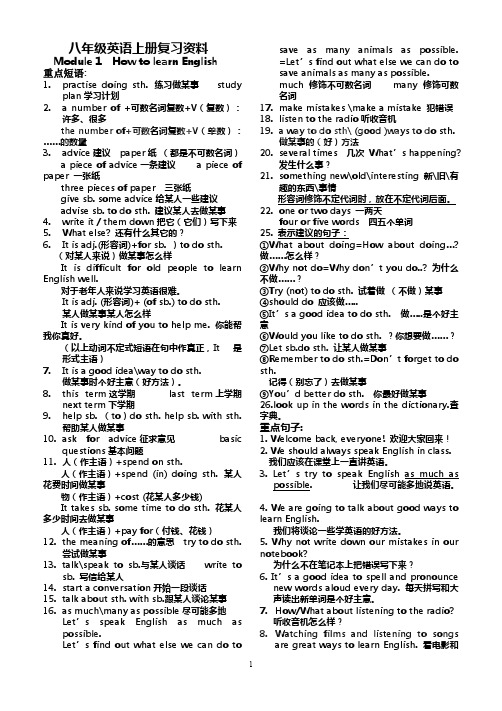
八年级英语上册复习资料Module 1 How to learn English重点短语:1.practise doing sth. 练习做某事studyplan学习计划2. a number of +可数名词复数+V(复数):许多、很多the number of+可数名词复数+V(单数):……的数量3.advice建议paper纸(都是不可数名词)a piece of advice一条建议 a piece of paper 一张纸three pieces of paper 三张纸give sb. some advice给某人一些建议advise sb. to do sth. 建议某人去做某事4.write it / them down把它(它们)写下来5.What else? 还有什么其它的?6.It is adj.(形容词)+for sb. )to do sth. (对某人来说)做某事怎么样It is difficult for old people to learn English well.对于老年人来说学习英语很难。
It is adj. (形容词)+ (of sb.) to do sth.某人做某事某人怎么样It is very kind of you to help me. 你能帮我你真好。
(以上动词不定式短语在句中作真正,It 是形式主语)7.It is a good idea\way to do sth.做某事时个好主意(好方法)。
8.this term这学期last term上学期next term下学期9.help sb. (to)do sth. help sb. with sth.帮助某人做某事10.ask for advice征求意见basicquestions基本问题11.人(作主语)+spend on sth.人(作主语)+spend (in) doing sth. 某人花费时间做某事物(作主语)+cost (花某人多少钱)It takes sb. some time to do sth. 花某人多少时间去做某事人(作主语)+pay for(付钱、花钱)12.the meaning of……的意思try to do sth.尝试做某事13.talk\speak to sb.与某人谈话write tosb. 写信给某人14.start a conversation开始一段谈话15.talk about sth. with sb.跟某人谈论某事16.as much\many as possible尽可能多地Let’s speak English as much as possible.Let’s find out what else we can do tosave as many animals as possible.=Let’s find out what else we can do tosave animals as many as possible.much 修饰不可数名词many 修饰可数名词17.make mistakes \make a mistake 犯错误18.listen to the radio听收音机19.a way to do sth\ (good )ways to do sth.做某事的(好)方法20.several times 几次What’s happening?发生什么事?21.something new\old\interesting 新\旧\有趣的东西\事情形容词修饰不定代词时,放在不定代词后面。
外研版英语:八年级(上册)各单元重点单词、短语、句型归纳
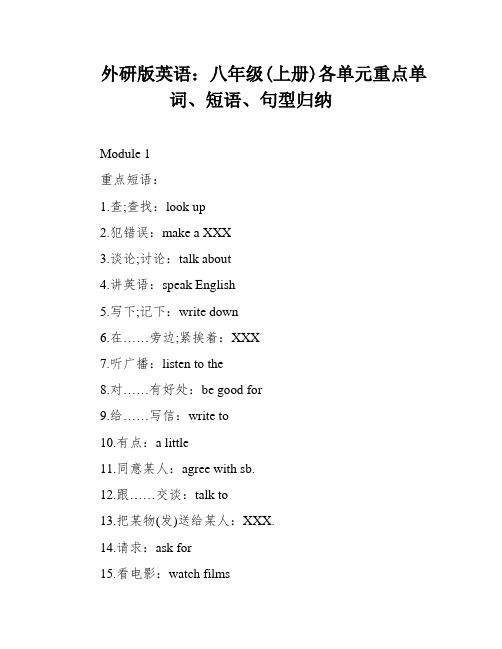
外研版英语:八年级(上册)各单元重点单词、短语、句型归纳Module 1重点短语:1.查;查找:look up2.犯错误:make a XXX3.谈论;讨论:talk about4.讲英语:speak English5.写下;记下:write down6.在……旁边;紧挨着:XXX7.听广播:listen to the8.对……有好处:be good for9.给……写信:write to10.有点:a little11.同意某人:agree with sb.12.跟……交谈:talk to13.把某物(发)送给某人:XXX.14.请求:ask for15.看电影:watch films16.来自:be from17.冲……微笑:smile at18.去睡觉:go to bed19.起床:get up20.考虑:think about21.与某人交朋友:make friends with sb.22.带领某人参观某地:take sb。
around sp.23.几个;一些:a few24.邀请某人到……:XXX25.擅长:be good at26.例如:for example重点句型:1.建议某人做某事:advise sb to do sth2.害怕做 (XXX)3.对……有好处的:be good for。
4.做……的(一种)好方法:be (a) great way(s) to do sth5.做某事是合乎常情的:It is natural to do sth.重点语法:1.Why not。
= Why don’t + you (we / they。
)。
意为“为什么不……呢?”,后接动词原形。
例如:Why not / Why don’t we help the old clean their rooms this afternoon。
今天下午为什么不去帮助老人打扫房间呢?2.What / How about。
外研版英语八年级上Module5重要词汇短语整理
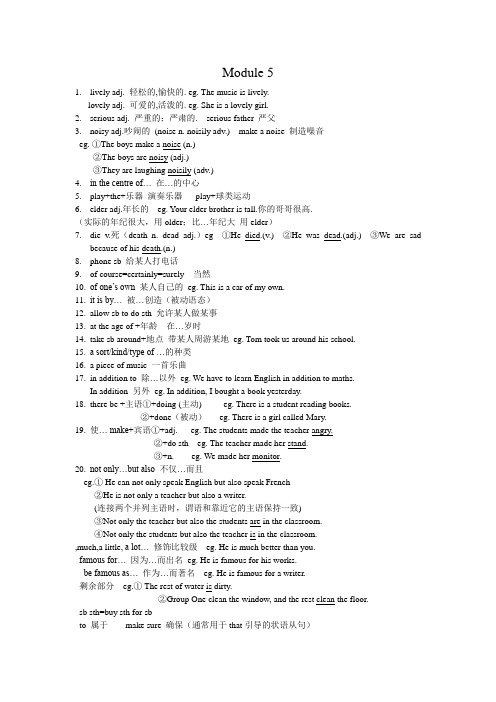
Module 51.lively adj. 轻松的,愉快的. eg. The music is lively.lovely adj. 可爱的,活泼的. eg. She is a lovely girl.2.serious adj. 严重的;严肃的. serious father 严父3.noisy adj.吵闹的(noise n. noisily adv.) make a noise 制造噪音eg. ①The boys make a noise (n.)②The boys are noisy (adj.)③They are laughing noisily (adv.)4.in the centre of… 在…的中心5.play+the+乐器演奏乐器play+球类运动6.elder adj.年长的eg. Your elder brother is tall.你的哥哥很高.(实际的年纪很大,用older;比…年纪大用elder)7.die v.死(death n. dead adj.)eg ①He died.(v.) ②He was dead.(adj.) ③We are sadbecause of his death.(n.)8.phone sb 给某人打电话9.of course=certainly=surely 当然10.of one’s own 某人自己的eg. This is a car of my own.11.it is by… 被…创造(被动语态)12.allow sb to do sth 允许某人做某事13.at the age of +年龄在…岁时14.take sb around+地点带某人周游某地eg. Tom took us around his school.15.a sort/kind/type of …的种类16.a piece of music 一首乐曲17.in addition to 除…以外eg. We have to learn English in addition to maths.In addition 另外eg. In addition, I bought a book yesterday.18.there be +主语①+doing (主动) eg. There is a student reading books.②+done(被动)eg. There is a girl called Mary.19.使… make+宾语①+adj. eg. The students made the teacher angry.②+do sth eg. The teacher made her stand.③+n. eg. We made her monitor.20.not only…but also 不仅…而且eg.① He can not only speak English but also speak French②He is not only a teacher but also a writer.(连接两个并列主语时,谓语和靠近它的主语保持一致)③Not only the teacher but also the students are in the classroom.④Not only the students but also the teacher is in the classroom.,much,a little, a lot… 修饰比较级eg. He is much better than you.famous for… 因为…而出名eg. He is famous for his works.be famous as… 作为…而著名eg. He is famous for a writer.剩余部分eg.① The rest of water is dirty.②Group One clean the window, and the rest clean the floor.sb sth=buy sth for sbto 属于make sure 确保(通常用于that引导的状语从句)。
外研版英语八年级上必背词汇句子
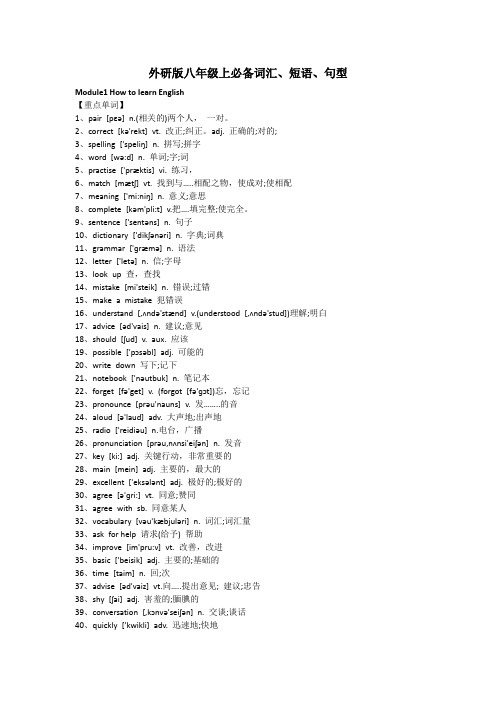
外研版八年级上必备词汇、短语、句型Module1 How to learn English【重点单词】1、pair [pεə] n.(相关的)两个人,一对。
2、correct [kə'rekt] vt. 改正;纠正。
adj. 正确的;对的;3、spelling ['speliŋ]n. 拼写;拼字4、word [wə:d] n. 单词;字;词5、practise ['præktis] vi. 练习,6、match [mætʃ] vt. 找到与…..相配之物,使成对;使相配7、meaning ['mi:niŋ]n. 意义;意思8、complete [kəm'pli:t] v.把….填完整;使完全。
9、sentence ['sentəns] n. 句子10、dictionary ['dikʃənəri] n. 字典;词典11、grammar ['ɡræmə]n. 语法12、letter ['letə] n. 信;字母13、look up 查,查找14、mistake [mi'steik] n. 错误;过错15、make a mistake 犯错误16、understand [,ʌndə'stænd] v.(understood [,ʌndə'stud])理解;明白17、advice [əd'vais] n. 建议;意见18、should [ʃud] v. aux. 应该19、possible ['pɔsəbl] adj. 可能的20、write down 写下;记下21、notebook ['nəutbuk] n. 笔记本22、forget [fə'get] v. (forgot [fə'ɡɔt])忘,忘记23、pronounce [prəu'nauns] v. 发……..的音24、aloud [ə'laud] adv. 大声地;出声地25、radio ['reidiəu] n.电台,广播26、pronunciation [prəu,nʌnsi'eiʃən] n. 发音27、key [ki:] adj. 关键行动,非常重要的28、main [mein] adj. 主要的,最大的29、excellent ['eksələnt] adj. 极好的;极好的30、agree [ə'ɡri:]vt. 同意;赞同31、agree with sb. 同意某人32、vocabulary [vəu'kæbjuləri] n. 词汇;词汇量33、ask for help 请求(给予) 帮助34、improve [im'pru:v] vt. 改善,改进35、basic ['beisik] adj. 主要的;基础的36、time [taim] n. 回;次37、advise [əd'vaiz] vt.向…..提出意见; 建议;忠告38、shy [ʃai] adj. 害羞的;腼腆的39、conversation [,kɔnvə'seiʃən] n. 交谈;谈话40、quickly ['kwikli] adv. 迅速地;快地41、natural ['nætʃərəl] adj. 合理的;合乎常情的42、suggest [sə'dʒest] vt. 提议,建议43、place [pleis] vt. 放置【重点短语】1. look up 查;查找2. make a mistake 犯错误3. talk about 谈论;讨论4. speak English 讲英语5. write down 写下;记下6. next to 在……旁边;紧挨着7. listen to the radio 听广播8. be good for doing 对……有好处(be good at doing...擅长做...)9. write to 给……写信10. a little 有点11. agree with sb. 同意某人12. talk to 跟……交谈13. send sth. to sb. 把某物(发)送给某人14. ask for 请求15. watch films 看电影16. be from 来自=come from17. smile at 冲……微笑18. go to bed 去睡觉19. get up 起床20. think about 考虑21. make friends with sb. 与某人交朋友22. take sb. around sp. 带领某人参观某地23. a few 几个;一些24. invite sb. to 邀请某人到……25. for example 例如26. advise sb. to do sth.建议某人做某事【重点句型】1. Welcome back, everyone! 欢迎大家回来!2. We should always speak English in class. 我们应该在课堂上一直讲英语。
(外研版)初中英语八年级上册知识点归纳总结
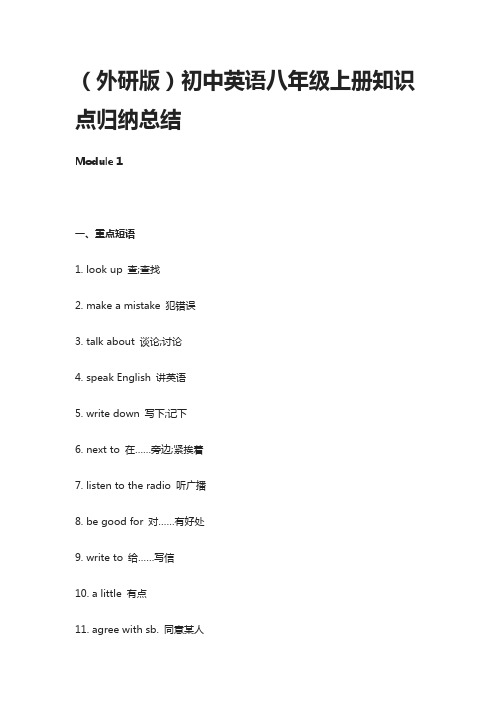
(外研版)初中英语八年级上册知识点归纳总结Module 1一、重点短语1. look up 查;查找2. make a mistake 犯错误3. talk about 谈论;讨论4. speak English 讲英语5. write down 写下;记下6. next to 在……旁边;紧挨着7. listen to the radio 听广播8. be good for 对……有好处9. write to 给……写信10. a little 有点11. agree with sb. 同意某人12. talk to 跟……交谈13. send sth. to sb. 把某物(发)送给某人14. ask for 请求15. watch films 看电影16. be from 来自17. smile at 冲……微笑18. go to bed 去睡觉19. get up 起床20. think about 考虑21. make friends with sb. 与某人交朋友22. take sb. around sp. 带领某人参观某地23. a few 几个;一些24. invite sb. to 邀请某人到……25. be good at 擅长26. for example 例如二、重点句型1. advise sb to do sth 建议某人做某事2. be afraid to... 害怕做……3. be good for... 对……有好处的4. be (a) great way(s) to do sth 做……的(一种)好方法5. It is natural to do sth. 做某事是合乎常情的。
三、重点语法1. Why not...? = Why don’t + you (we / they...)...?意为“为什么不……呢?”,后接动词原形。
eg:Why not / Why don’t we help the old cleantheir rooms this afternoon?今天下午为什么不去帮助老人打扫房间呢?2. What / How about...? 意为“……怎么样?”,其中about 是介词,后接名词或动词-ing 形式。
外研版八年级上英语各模块知识点汇总

外研版八年级上英语各模块知识点汇总Module1 How to learn English 模块知识清单一、重点词组1、talk about 谈论,谈及2、that’s a good idea 好主意3、agree with somebody 同意,和…意见一致4、look up 查阅,仰望,向上看5、make a mistake 犯错误6、as much as possible 尽可能多地7、write to somebody 给某人写信8、write down 写下9、try to do 尽力做某事10、how/What about+ doing 做…怎么样11、why not/don’t you+ do 为什么不…12、should/can do 应该/能够做某事13、ask for advice 征求意见14、advise somebody to do something15、suggest somebody (should) do 建议某人做某事16、be afraid to do 害怕做某事17、start a conversation 开始交谈18、be good at doing=do well in doing 擅长做某事19、let’s try to do something 让我们努力做20、It’s a good idea to do 做…是个好主意21、remember to do 记得做某事22、practice doing 练习做某事23、make friends with 和…交朋友24、invite somebody to someplace 邀请某人去…25、make plans 制定计划二、重点句型1、We should always speak English in class.情态动词should /shouldn’t ,should 表示应该shouldn’t不应该You should speak English every day.He shouldn’t tell you the bad news.2、Don’t forget to write down the correct answers next to the mistakes. What else? write down 写下记下代词必须放在两个词之间名词可以放在中间也可以放在末尾如write it down (正)write the sentence down (正)write down it (误)write down the sentence (正)类似的短语有: put on pick up 等next to 紧挨着、紧靠着The little boy sat next to his mother.My home is next to a bank. 【同义词】near 在附近3、Many students ask for advice about how to improve their English。
外研版八年级英语上册module重点短语及语法

八年级英语上册重点短语及语法Module 1 how to learn English1.in pairs 成双的,成对的2.match——with——把与配对3.welcome back欢送回来welcome back to---欢送回至U4.the way to do sth做某事的方法5.some advice 一些建议advise sb to do sth建议某人做某事比拟:suggest+sb. (should) do sth.建议某人做某事suggest doing sth建议做某事6.try to do sth 尽力做某事try not to do sth尽力不要做某事try doing sth 尝试做某事7.as much as possible尽可能多地8.write down 写下, 记下write them down 把它们写下来9.make a mistake / make mistakes 犯错误10.forget to do sth忘记去做某事forget doing sth忘记做过某事remember to do sth记得去做某事remember doing sth记得做过某事11.so many+可数名词复数如此多的so much+不可数名词so+adj. 如止匕12.get to know开始知道13.agree with sb.同意某人的观点14.need to do sth. 需要做某事15.key words 关键词main idea 大意16.That s a good idea.那是一个好主意17.what else?还有什么其他的吗?18.Thanks a lot. = Thank you very much.非常感谢.19.send sb sth.= send sth to sb把某物寄给某人20.ask for 请求,寻求ask for advice请求建议,ask for help 寻求帮助ask sb for向某人索要21.1mprove their English提升他们的英语22.how to do sth如何做某事23.basic questions 根本的问题24.several times 几次each time 每次time 表示次数可数,时间不可数25.something new——些新的东西26.the meaning of- 的意思27.be afraid to do sth 害怕做某事be afraid of sth/sb担忧某物、某人28.start a conversation开始——段对话29.smile at---对——微笑30.speak quickly 快速地说31.take--- around带----参观32 .millions of 数百万的33 .worry about = be worried about 担忧----34 .a piece of ---一张/ 片/块 a piece of paper 一张纸 two pieces of paper 两张纸35 .It is + adj.+ (for sb ) + to do sth (对于某人来说)做某事是怎样的It is + adj.+ (of sb ) + to do sth 做某事觉得某人是怎样的.常用句型:提建议的方式We should do sth. 我们应该做某事. should+v 原形Why not do sth---?= why don ' t you/we do sth--?为何不做某事呢? What/how about doing sth? 做某事怎么样? Let' s do sth.让我们做某事吧.Shall we do sth?我们做某事好吗?It ' s a good idea to do sth.做某事是一个好主意. You' d better do sth.你最好做某事.Module 2 my home town and my country1. pretty good = very good 相当好 pretty adv. 非常,很 She looks pretty.她看起来很漂亮.Pretty adj. 漂亮的2. on the coast 在海岸线上3. in fact 事实上4. in the 1980s 在 20 世纪 80 年代5. get bigger and busier 变得更大共更繁忙 get 指 sth become famous 变得有名become 指 sb6. some day 某一天,用于将来时one day 某一天,用于过去时和将来时 7. as+adj/adv.原级+as 和—— 一样 8. what' s the population of + 地点?表示人口 ‘多‘和“少〞,不用much, little 而要用large, small has a population of + 数字〔京地〕有—— 人口9. come from= be from 来自 10.in the east of --- in 在地点内部 Chengdu is in the west of Sichuan. Yunnan is on the south of Sichuan. Japan is to the east of China. .11.on the River Cam 在康河河畔12.be famous for + sth 因---- 而着名be famous as + 职业. 作为—— 而着名 14. such as 比方列举同类事物中的几个例子for example 例如列举一个例子,一般用逗号隔开15. old buildings and churches to visit 可参观的古老建筑物和教堂 Much homework to do 许多要做的家庭作业 Something to eat 一些吃的东西 16. be popular with---17. show sb. sth. = show sth to sb 语法:形容词比拟级〔一〕1 .结构:主语+ be 动词+ adj.比拟级+ than+ 宾语 --- 比--- 更She is taller than me.她比我高.on 两点接壤to 两地不接壤 成都在四川的西部.云南在四川的南边. 日本在中国的东边.给某人展示某物〔注意〕当比拟两个事物时,英语中要用到比拟级的句型结构,其中标志词为than.2. adj比拟级构成:3.much --- a little evenEg: Mike is much stronger than me. 迈克比我强壮得多She is a little taller than me.她比我通高.Jack works even harder at maths than you杰克在数学方面比你学得]OJ力.4.用比拟级表示最高级:比拟级+than+any other +可数名词单数Eg: Changjiang is longer than any other river in china长江比中国任何一条河流都长..=Changjiang is the longest river in china.长江是中国最长的河流.5.比拟级常考几种题型.1)比拟级+than I ' m fatter than you.2)Which引导的选择疑问句,两者之间Which one is bigger, this one or that one?3)比拟级+比拟级表示越来越——I ' m getting fatter and fatter.4)The+比拟级,the+比拟级越-----,就越-----The harder you work, the better you will do.你工作越努力,就会做得越The more you eat, the fatter you will be.你吃得越多,就会变得越胖.5)as----as——和---- 一样she is as fat as me. 她比我胖.not as/so---as 不及--- (中间用原级) she isn ' t as fat as me.她不及我胖.Module3 sports1.what' s the score?比分是多少?2.what' s the matter? = what ' s wrong? 怎么了?What' s the matter with --- ? = what ' s wrong with--- ?----怎么了?3. look tired 看起来很累.4. plenty of = lots of = a lot of =many/much 大量, 许多5. not --- at all 一点也不,根本不6. that ' s because --- 那是由于7. bad luck 坏运气 good luck 好运气8. Never mind!别介意!9. fan club 球迷俱乐部 10. play against 对抗,同---比赛 11. so that + 句子目的是,为了 12 .warm up 热身13 .have a chance of ---- 有个---- 时机 14 .be late for--- 迟到,来晚 15 .be pleased with sth/sb. 对----满意be pleased to do sth 对做某事满意 16 .what a pity! 多么可惜啊!17 .get lost= be lost 迷路lose to ——18 .keep fit = keep healthy = stay healthy 保持健康19 .all the same 仍然 at first 首先20 .around the world = all over the world21 . - ed, -ing 结尾的形谷词的用法:-ed 结尾的修饰人-ing 结尾的修饰物interested 感兴趣的interesting 有趣的beautiful- more beautiful interesting- more interesting important- more important dangerous- more dangerous22 由形容词加ly 构成的双音节词和多音节词,都是在该词前面加ly 构成比拟级 slowly- more slowly quickly- more quickly 3.4.形容词和副词的用法1〕形容词通常放在名词之前,作定语,或者放在系动词〔be, look, get, become---〕 后,作表语 a beautiful flower 一朵漂亮的花 The teacher is careful.这位老师很细心excited 兴奋的exciting relaxed 放松的relaxingbored 无聊的 boring tired 劳累的tiring形容词比拟级〔二〕和副词的比拟级1.构成:局部双音节词和多音节词, 令人冲动的 令人放松的 枯燥的,乏味的 令人劳累的在该词前面加more 构成比拟级.2〕副词修饰动词放在后面Listen carefully 很仔细地听 dance really well 跳舞跳得真好 run fast/slowly 跑得快 /慢4. most of 大多数的5. heavy traffic 拥挤的交通6. That' s a good choice.是一个好的选择7. a bit=a little 一点儿(修饰 adj/adv ) a bit tired 一点儿累8. the same as ——— 和——— 相同 be different from ———和 不同 9. far from 远离 be /get close to 离--- 近 10. a crowded street 一条拥挤的街道 11. all the time 一直,总是12. Don' t worry! = Don ' t be worried! 别担忧! 13. 花费1) take 主语一般是it ,或者是sthIt takes/took sb some time to do sth. 2) Spend 主语只能是sb:sb. spend/ some time/some money on sthsb. spend some time/some money (in) doing sth. 3) pay 主语是sb : pay for 支付sb. pay some money for sth.4) cost 主语是sth,表示价钱为----sth cost (sb) some money14. have to 不得不 15. wait for 等待 16. at the airport 在机场 17. because + 句子 由于—— because of + 单词/ 短语 由于 18. cross= go across 穿过19. however 然而,但是表示转折,通常用逗号与句子其他成分隔开语法:形容词和副词最高级的用法1. what happened? Sthhappened +Module 4 planes, ships, and trains发生什么事了: What' s happening?正在发生什么事? 时间/地点Sth happened to sbSb happens/ed to do sth 2. by +交通工具作方式状语某事发生在--- 某人出了某事 某人碰巧做某事by bus/train/taxi/plane乘公交/火车/出租/飞机实义动词take 表乘坐take the/a bus Ride abike= by bike= on a bike/ on one Take the bus = bybus= on/in a bus 3. a traffic accident 起交通事故 坐公交车take the underground 乘地铁'bike 骑自行车 乘公交车 by accident 偶然2 .most beautiful- most beautiful interesting- most interesting important- most important dangerous- most dangerous3 . adj/adv 最高级的用法1) adj/adv 最高级 + in/of Jack is the tallest in our class.杰克是我们班最局的.Jack is the tallest of the three.杰克是三个中最高的.2〕选择疑问句中,三者及三者以上时Which student is the tallest, Jim, Joe or Daming?3〕 One of +adj/adv.最高级+可数名词复数 表示最---之一Lao she is one of the most famous writers in china. 4〕序数词+ adj 最高级Changing river is the first longest rive 门n china.Module 5 Lao Shao Teahouse1. take sb. to sw.带某人去某地2. You know. 你知道的.3. in the end 最后 at the end of---在—— 末尾 at the beginning of的开始4. That ' s the main thing.那是主要的事情5. No idea.= I have no idea.= I don6. common people 普通人7.in the twentieth century8. finish school 毕业 9. return= come/go back 回来 10. give a warm welcome to --- 11. translate ---- into — 12. over= more than 超过13. be named= be called ---14. take place 发生〔指有方案,有预谋的发生〕The Olympic Games of 2022 took place in Beijing.happen 发生〔指事情偶然或没有预见的发生〕 An accident happened on the street.'t know. 不知道.在20世纪return to---= come/go back to 热烈欢送----- 把—译成— 被称为—回到某地常见动词接双宾语的:1. send sb. sth = send sth to sb2. give sb. sth = give sth to sb.3. tell sb. sth. = tell sth. to sb.4. teach sb. sth. = teach sth. to sb.5. show sb. sth. = show sth. to sb.6. lend sb. sth. = lend sth. to sb.7. return sb. sth. = return sth. to sb8. offer sb. sth. = offer sth. to sb.9. take sb. sth. = take sth. to sb. 10. pass sb. sth. = pass sth. to sb. 11. tell sb. sth. = tell sth. to sb. 12. buy sb. sth. = buy sth. for sb. 13. make sb. sth. = make sth. for sb. 14. cook sb. sth. = cook sth. for sb. 15. book sb. sth. = book sth for sb.Module 6 Animals in danger1. at last= in the end = finally 最后2. be interested in sth/ doing sth.对某事/做某事感兴趣3. think of = think about 想至L 想起What do you think of/ about?你认为---- 怎么样 4. protect---- from ——保护---- 免受---- 伤害 5. take away 带走,拿走 6. grow up 成长 7. have a safe place to live 有一个平安的居住地 8. in peace 平静地 in danger 处于危险之中 9. look after = take care of 照顾 10. find out 找出,查明(通过调查)11. help sb (to) do sth.帮助某人做某事help sb with sth 帮助某人某事 12. wild animals 野生动物in the wild 在野外研究中央 do a lot of research 做大量研究严峻的形势 15. in the forest 在森林里16.in order to + do sth 为了--- so that + 句子 目的是,为了17.set up 建立 18. developplans = make plans 制定计戈^19. many kinds of---许多种---- a kind of----一种语法:固定搭配:常见动词不定时to do 的用法1. want to do sth. = would like to do sth.2. plan to do sth.计戈 U 做某事4. decide to do sth.希望做某事6. agree to do sth.学习做某事 8. promise to do sth. 需要做某事叫某人做某事 11. tell sb. to do sth.把某物寄给某人 把某物给某人把某事告诉某人 教某人某事 拿某物给某人看 把某物借给某人 把某物还给某人 把某物提供应某人 把某物带给某人 把某物递给某人 告诉某人某事 为某人买某物 为某人制作某物为某人煮/烹饪某物 为某人预订某物13. research centre 14. difficult situation3. offer to do sth. 5. hope to do sth.7. learn to do sth.9. need to do sth. 10. ask sb. to do sth决定做某事 同意做某事 保证做某事 告诉某人做某事12. wish sb. to do sth某事14. want sb. to do sth.做某事后面只能接原形do的动词: 1.see sb. do /doing sth. look at sb.do sth.2.hear sb do/ doing sth. listen tosb. do sth3.make sb do sth4.let sb. do sth5.feel sb do sth. 希望某人做某事13. advise sb to do sth 想要某人做某事15. offer sb. to do sth.看见某人〔正在〕做某事看见某人做某事听见某人〔正在〕做某事看见某人做某事使某人做某事让某人做某事感觉某人做某事6.情态动词:can, should, could, may, must 〔必须〕do sth.7.had better do sth. 最好做某事8. why not ---= why don ' t you do sth.To do和doing意思无差异的动词:1.like /love to do sth.= like/love doing sth2.start to do sth.= start doing sth. 为何不做某事呢?喜欢做某事开始做某事建议某人做提议某人To do和doing意思差异很大的动词:1.forget to do sth忘记去做某事2.remember to do sth记得去做某事3.try to do sth.尽力做某事forget doing sth remember doing sth try doing sth4. stop to do sth 停下来去做另一件事情stop doing sth 忘记做过某事记得做过某事尝试做某事停止做某。
外研版初二英语上学期阶段复习M5-8知识点背诵版

M5 U1 单词1.n.女演员actress2.n. (尤指亚洲)的茶馆teahouse3.v.提议;提出offer4.n. (时间的) 最后一段、末尾end5.v. 结束end6.最后;终于in the end7.不知道no ideaM5 U1 短语1.看着look at2.谈论talk about3.想要做want to do4.做…是困难的it is difficult to do5. 计划做plan to do6.最后in the end7.待3小时stay for 3 hours8.主要的事情main thing 9.希望做hope to do10.下次next time11.带…去take…to12.因为…著名be famous for13.不知道no idea14. 计划做plan to do15.愿意做would like to do16.了解.know aboutM5 U1短文翻译①Betty 想要去看京剧,因此玲玲主动带Betty去老舍茶馆。
②京剧的词很难懂,但是男演员和女演员都很棒。
③他们本来仅仅打算只看一个小时,但是最后他们待了4个小时。
④Betty认为它(京剧)太棒了——那才是最主要的事情。
①Betty wanted to see the Beijing opera, so Lingling offered to take Betty to Lao She Teahouse. ②The words of the opera were difficultto understand, but the actors and actresses were excellent. ③They only planned to watch for an hour, but in the end,they stayed for three hours. ④Betty thought it was interesting — that was the main thing!M5 U2 单词1.n. (戏剧、歌剧或芭蕾舞的)一幕act2.v. 展示; 显示show3.n. 演出; 表演show4.adj. 普通的; 一般的common5.num. 第二十twentieth6.v. 描写; 描述describe7.n. 社会society 8.n.校长head teacher9.n. 大学; 学院college10.n. (长篇)小说novel11.v. 给......取名; 给......命名name12.conj. 如果; 若if13.adj. 魔术的; 戏法的magicM5 U2 短语1.其中之一one of2.普通人的生活the lives of common people3.从…到…from…to4.…的结尾the end of5. .…的中间the middle of6. .…的故事the story of7.50多年over 50 years8.出生于(某地)be born in9.送某人去sent sb. to10.校长head teacher11.在…之后after doing12.返回return to13.被叫做.be named14. 二十世纪the twenties century15.传统音乐traditional music 16.给…热烈欢迎give a warm welcom to17.魔法秀magic show18.全世界all over the world18.M5 U2短文翻译①老舍的剧本茶馆有三幕。
初二英语上册(外研版)Module5 重点知识点

Module5 Lao She TeahouseUnit 1 I wanted to see the Beijing Opera.一.重点单词1. actress n. 女演员→(对应词)actor n. 男演员2. teahouse n. (尤指亚洲的)茶馆3. offer v. 提议;提出4. end n. (时间的)最后一段,末尾v. 结束二.重点短语1. how long 多久2. in the end 最后;终于3. no idea 不知道4. be famous for 因……而著名5. would like 想要6. offer to do sth. 主动提出做某事7. hope to do sth. 希望做某事三.重点语法1.offer的用法①offer sth. 提供某物例:She offered a book. 她提供了一本书。
①offer sb. sth. /offer sth. to sb. (主动)给某人提供某物例:He offered me an apple/offered an apple to me.他主动给了我一个苹果。
①offer to do sth. (主动)提出做某事例:Lingling offered to drive me home.玲玲主动提出开车送我回家。
2.in the end的用法in the end的意思是“最后”= finally = at last例:In the end,we got to the small village.最后,我们到达了那个小山村。
3.以下句子是含有动词不定式的句子I wanted to see the Beijing Opera, so Lingling offered to take me there.No, it was difficult to understand the words.We only planned to watch for an hour.I hope to understand more next time.Do you often go to see the Beijing Opera, Lingling?I wanted to take Betty to the teahouse because it’s famous.(1)动词不定式的形式动词不定式的基本形式是“to+动词原形”,常写作to do(有时to可以省略),否定形式为not to do。
最新外研版八年级上册英语Module 5 基础词汇及句型总结
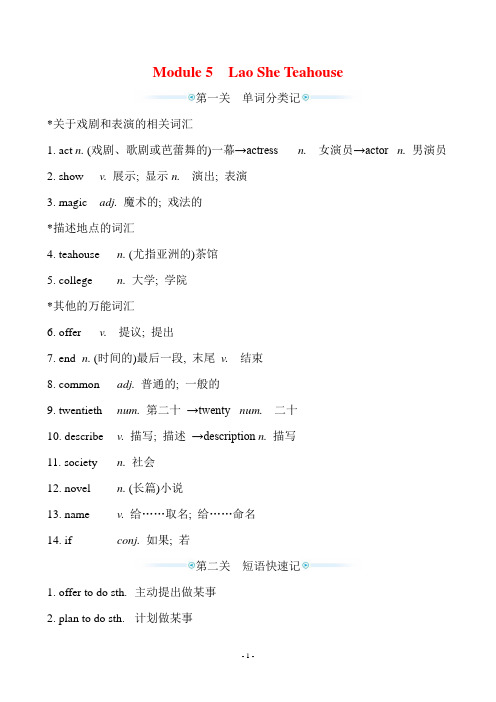
Module 5Lao She Teahouse第一关单词分类记*关于戏剧和表演的相关词汇1. act n. (戏剧、歌剧或芭蕾舞的)一幕→actress n. 女演员→actor n. 男演员2. show v. 展示; 显示n. 演出; 表演3. magic adj. 魔术的; 戏法的*描述地点的词汇4. teahouse n. (尤指亚洲的)茶馆5. college n. 大学; 学院*其他的万能词汇6. offer v. 提议; 提出7. end n. (时间的)最后一段, 末尾v. 结束8. common adj. 普通的; 一般的9. twentieth num. 第二十→twenty num. 二十10. describe v. 描写; 描述→description n. 描写11. society n. 社会12. novel n. (长篇)小说13. name v. 给……取名; 给……命名14. if conj. 如果; 若第二关短语快速记1. offer to do sth. 主动提出做某事2. plan to do sth. 计划做某事3. in the end 最后; 终于4. hope to do sth. 希望做某事5. no idea 不知道6. be famous for 因……而闻名7. one of. . . ……之一8. finish school 毕业9. head teacher 校长10. return to 返回11. be named 被命名12. give a warm welcome to sb. 热烈欢迎某人13. take place 发生第三关句式秒杀记1. —How was it? 它怎么样?—It was great! 非常好!2. You know, I wanted to see the Beijing Opera, so Lingling offered to take me there. 你知道, 我想看京剧, 因此玲玲主动提出带我去那里。
外研版英语八年级上册Module 5 重难点知识归纳总结

Module 5【重点单词】1.actress[ˈæktrəs]n.女演员2.teahouse['tiːhaʊs]n.(尤指亚洲的)茶馆3.offer['ɒfə]v.提议;提出4.end[end]n.(时间的)最后一段,末尾v. 结束5.act[ækt]n.(戏、歌、芭蕾)剧的一幕6.show[ʃəʊ]v.展示;显示7.show[ʃəʊ]n.演出;表演mon ['kɒmən] adj. 普通的;一般的9.twentieth['twentɪəθ]num.第二十10.describe[dɪ'skraɪb]v.描写;描述11.society [sə'saɪəti]n.社会12.college['kɒlɪdʒ]n.大学;学院13.novel['nɒvl]n.(长篇)小说[neɪm]v.给……取名;给……命名15.if [ɪf] conj.如果;若16.magic['mædʒɪk]adj.魔术的;戏法的【重点短语】1.send sb. sth. 送某人某物2.think of认为3.take sth. out of 从……拿出某物4. get up起床5. on one’s way to … 在某人去……的路上6. in the end 最后,最终7. take sb. to someplace 带某人到某地8. No idea. 不知道9. in the twentieth century 在二十世纪10. after finishing school 毕业后11. be named被称为……12. magic show魔术表演13. traditional music/food/festival传统音乐/食物/节日14. give a warm welcome to (sb.) 热烈欢迎(某人)15. all over the world 全世界16. offer to do sth. 主动提议做某事17. agree to do sth. 同意去做某事18. be glad/happy to do sth. 高兴做某事19. buy sb. sth.=buy sth. for sb. 为某人买某物20. take place 发生【重点句型】1.I want to see the Beijing Opera.我想去看京剧。
2022年中考英语外研版八年级上册Modules5-8知识点详解与练习
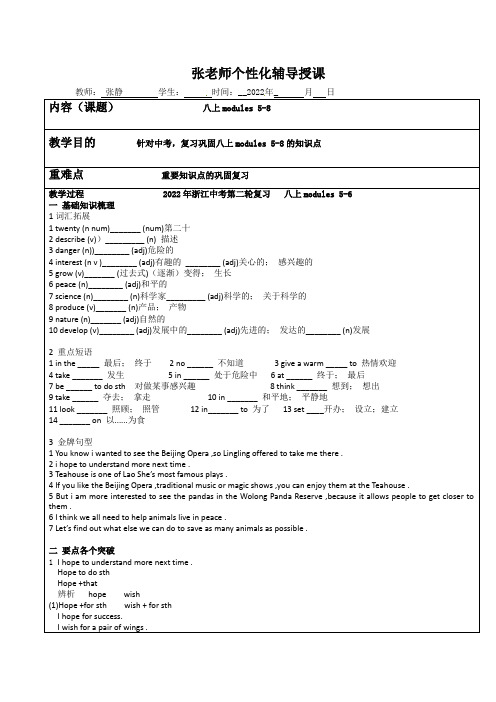
张老师个性化辅导授课教师:张静学生:时间:__2022年_ 月日内容(课题)八上modules 5-8教学目的针对中考,复习巩固八上modules 5-8的知识点重难点重要知识点的巩固复习教学过程 2022年浙江中考第二轮复习八上modules 5-6一基础知识梳理1词汇拓展1 twenty (n num)_______ (num)第二十2 describe (v))_________ (n) 描述3 danger (n))________ (adj)危险的4 interest (n v )________ (adj)有趣的________ (adj)关心的;感兴趣的5 grow (v)_______ (过去式)(逐渐)变得;生长6 peace (n)________ (adj)和平的7 science (n)________ (n)科学家_________ (adj)科学的;关于科学的8 produce (v)_______ (n)产品;产物9 nature (n)_______ (adj)自然的10 develop (v)________ (adj)发展中的________ (adj)先进的;发达的________ (n)发展2 重点短语1 in the _____ 最后;终于2 no ______ 不知道3 give a warm _____ to 热情欢迎4 take _______ 发生5 in ______ 处于危险中6 at ______ 终于;最后7 be ______ to do sth 对做某事感兴趣8 think _______ 想到;想出9 take ______ 夺去;拿走10 in _______ 和平地;平静地11 look _______ 照顾;照管12 in_______ to 为了13 set ____开办;设立;建立14 _______ on 以......为食3 金牌句型1 You know i wanted to see the Beijing Opera ,so Lingling offered to take me there .2 i hope to understand more next time .3 Teahouse is one of Lao She’s most famous plays .4 If you like the Beijing Opera ,traditional music or magic shows ,you can enjoy them at the Teahouse .5 But i am more interested to see the pandas in the Wolong Panda Reserve ,because it allows people to get closer to them .6 I think we all need to help animals live in peace .7 Let’s find out what else we can do to save as many animals as possible .二要点各个突破1 I hope to understand more next time .Hope to do sthHope +that辨析hope wish(1)Hope +for sth wish + for sthI hope for success.I wish for a pair of wings .(2)Wish sb to sth(3)Hope that (希望) wish that (愿望)(4)Wish sb sth2 Teahouse is one of LaoShe’s most famous plays .One of+ adj最高级+n(pl)One of +n (pl)谓语动词的单复数One of the students in the class _____ my good friend .He is one of the students who ______ been to China .He is the one of the students who _____ been to China .3 If you like the Beijing Opera ,traditional music or magic shows ,you can enjoy them at the Teahouse .If ( )引导条件状语从句,从句用一般现在时,主句可以是________________________________If ( ) 引导宾语从句4 But i am more interested to see the panda in the Wolong Panda Reserve ,because it allows people to get close to them .Be interested in (take an interest in )Allow sb to do sth allow doing sth sb be allowed to do sth5 It is said to think of pandas and other animals in danger .Think of think about think over(1)what do you __________ the movie last night ?I can’t _______ your name .I often _______ what you said last time i saw you .These questions are hard ,you must _____them _______?6 Also ,often there isn’t enough water .Enough的用法浙江名师预测基础知识过关一词汇应用。
- 1、下载文档前请自行甄别文档内容的完整性,平台不提供额外的编辑、内容补充、找答案等附加服务。
- 2、"仅部分预览"的文档,不可在线预览部分如存在完整性等问题,可反馈申请退款(可完整预览的文档不适用该条件!)。
- 3、如文档侵犯您的权益,请联系客服反馈,我们会尽快为您处理(人工客服工作时间:9:00-18:30)。
语法剖析反意疑问句是英语四大问句之一,它是由一个陈述句加上一个短问句而构成的。
反意疑问句的基本构成形式是:陈述句+动词(肯定或否定)+主语?如:①She often has lunch at school, doesn’t she?②You don’t like sports, do you?使用反意疑问句要注意以下若干对应规则:一. 反意疑问句中问句部分的动词与陈述部分的动词在语气上成相反的对应关系,即:肯定+否定?否定+肯定?如:①You can’t do it, can you?②They are very late for the meeting, aren’t they?二. 反意疑问句中问句部分的动词与陈述部分的动词种类要对应一致。
如:①He has supper at home every day, doesn’t he? (不能用hasn’t he?)②They have known the matter, haven’t they? (不能用don’t they?)三. 反意疑问句中问句部分的动词在时态上应和陈述部分的时态一致。
如:①They will go to town soon, won’t they?(不能用don’t they?或aren’t they?)②He works very hard, doesn’t he?(不能用didn’t he?或won’t he?)四. 反意疑问句的陈述部分含有由un-, im-, in-, dis-, 等否定意义的前缀构成的词语时,陈述部分要视为肯定含义,问句部分用否定形式。
如:①Your father is unhappy, isn’t he?(不能用is he?)②The man is dishonest, isn’t he? (不能用is he?)③It is impossible to learn English without remembering more words, isn’t it?(不能用is it ?)五.反意疑问句的陈述部分带有little, few, never, hardly, seldom等否定意义的词时,问句部分用肯定式。
如:①She never tells a lie, does she?(不用doesn’t she?)②He was seldom late, was he?(不用wasn’t he?)六.反意疑问句的陈述部分为I am……时,问句部分习惯上用aren’t I?表示。
如:I am a very honest man, aren’t I?七.当陈述部分为复合句时:1.反意疑问句的陈述部分为I(We) think(believe, suppose, consider) + that从句时,问句部分的动词及主语与that从句内的动词和主语保持一致。
如:①I think that he has done his best, hasn’t he?②We think that English is very useful, isn’t it? (不用don’t we?)2.反意疑问句的陈述部分为I(We) don’t think(believe, suppose, consider)+ that从句时,从句为否定意义,问句部分的动词和主语仍与that从句保持一致且用肯定式。
如:①I don’t think that you can do it, can you? (不用do I?)②We don’t believe that the news is true, is it? (不用do we?)3.反意疑问句的陈述部分为非第一人称主语+ think(believe, suppose, consider) + that从句时,问句部分的动词和主语与陈述部分的主句动词和主语保持一致。
如:①They all think that English is very important, don’t they? (不用isn’t it?)②He didn’t think that the news was true, did he? (不用wasn’t/ was it?)八.反意疑问句的陈述部分为主语+said( told, reported, asked……) + that从句时,问句部分的动词和主语与陈述部分的主句动词和主语保持一致。
如:①They said that you had finished your work, didn’t they? (不用hadn’t you)②Kate told you that she would go there, didn’t she? (不用wouldn’t she?)九.陈述部分的主语为指物的不定代词something, anything, nothing, everything时,问句部分的主语用it。
陈述部分的主语为指人的不定代词somebody(someone), anybody(anyone), nobody(no one), everybody(everyone)时,问句部分的主语用he或they,这时问句动词的数应和he或they一致。
如:①Something is wrong with the computer, isn’t it?②Nothing has happened to them, has it? 如:③Someone has taken the seat, hasn’t he?④Everyone has done their best in the game, haven’t the y?十.陈述部分为Let me……时,问句部分习惯上用shall I? 或will you?形式。
如:Let me have a try, shall I?(will you?)陈述部分为Let us……时,问句部分习惯上用will you?形式。
如:Let us stop to rest, will you?陈述部分为Let’s……时,问句部分习惯上用shall we?形式。
如:Let’s go home together, shall we?十一.陈述部分肯定祈使句时,问句部分一般用will you?形式表示请求,用won’t you?形式表示委婉请求或邀请。
陈述部分为否定祈使句时,问句部分一般用will you?形式。
如:①Do sit down, won’t you?/ will you?②You feed the bird today, will you?③Please open the window, will you?(won’t you?)④Don’t make any noise, will you?十二.陈述部分为There (Here) + be + 主语时,问句部分用动词+there(here)?形式。
如:①There are two cakes on the plate, aren’t there?②Here is a story about Mark Twain, isn’t here?十三.陈述部分用had better +原形动词表示建议时,问句部分用hadn’t +主语?形式。
①You’d better tell him about the matter, hadn’t y ou?②We had better do it by ourselves, hadn’t we?十四.陈述部分用used to +主语时,问句部分用didn’t + 主语?或usedn’t +主语?形式。
①He used to live in the country, didn’t he?/usedn’t he?②They used to be good friends, didn’t they?/usedn’t they?十五.陈述部分含有时1.当must表“必须”时,疑问部分用needn’t。
如:She must stay at home, needn’t she?2.当mustn’t表“禁止”时,疑问部分用must。
如:You mustn’t play with fire, must you?3.当must表“一定;想必”等推测意义时,问句部分的助动词应和must后面的助动词相呼应。
如:It must be delicious, isn’t it?They must be playing basketball, aren’t they?十六.陈述部分的主语为从句时,问句部分的主语一般用it代替,如:①What he said is true, isn't it? (不用didn’t he?)②Where we will build the dam has not been decided yet, has it? (不用won’t we?)十七.陈述部分的主语为动名词或不定式时,问句的主语用it代替。
如:①To do one good deed is easy for a person, isn't it?②Skating is your favorite sport, isn't it?课堂练习完成下列反意疑问句:1.Mary wants to be a teacher, ?2.Don’t open your book,?3.You’ve lived in Hawaii for many years,?4.He’s never been to the USA before,?5.I don’t think you can answer th is question, ?6.Let’s ask our teacher for help,?7.Everything goes well, ?8.There will be much more trees, ?9.He must do the job, ?10.My father had to work very late, ?11.Tom didn’t like it,?12.You can find another place to live in, ?13.This isn’t your computer,?14.We’d better get there on time,?15.He hardly watches TV, ?反意疑问句1. The movie that we saw last week was quite interesting, ______?A. wasn’t itB. was itC. didn’t weD. weren’t we2. Tom has been writing letters all afternoon, but he should have finished them by now, ______?A. hasn’t heB. has heC. shouldn’t heD. didn’t you3. David told me that you would take a trip to America, ______?A. would youB. wouldn’t youC. did youD. didn’t you6. Any one can join the club, ______?A. can any oneB. can’t any oneC. can’t theyD. can they7. Tell me how to operate the electronic computer, ______?A. will youB. shan’t youC. do youD. don’t you8. May scarcely comes to visit you on Christmas Day, ______?A. doesn’t sheB. does sheC. do youD. don’t you9. Let’s listen to the radio program that the teacher mentioned, ______?A. do weB. don’t weC. shall weD. shan’t weModule 6 A famous story过去进行时1.I was playing basketball at that time yesterday/ at 9:00 yesterday.2.I was playing basketball when you went there.3. —I went to visit you yesterday. But you were not at home.—Oh, I was playing football outside then.。
